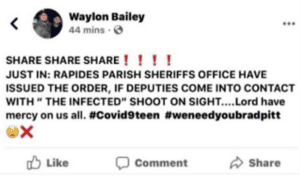Bailey v. Iles, 2023 WL 5490194 (5th Cir. 2023)
At the start of the COVID-19 pandemic, Waylon Bailey published a sarcastic Facebook post with the hashtag “#weneedyoubradpitt” (a reference to the zombie movie World War Z, starring Brad Pitt). The post stated that the Rapides Parish Sheriff’s deputies had orders to shoot infected people on sight. A Sheriff’s Office detective was assigned to investigate. He regarded the post as something “meant to get police officers hurt” and concluded Bailey had committed the crime of “terrorizing” under Louisiana state law.
According to Bailey, “As many as a dozen deputies with bullet proof vests and weapons drawn approached him and ordered him to put his hands on his head,” after which the investigating detective told Bailey to get on his knees, handcuffing him. One of the deputies allegedly told Bailey, the “next thing put on Facebook should be not to f— with the police.” Bailey was jailed and released on bail. He told the detective he had “no ill will towards the Sheriff’s Office; he only meant it as a joke.” Bailey deleted the post and no charges were ever filed.
Bailey sued, alleging First and Fourth Amendment violations. The investigating deputy acknowledged he arrested Bailey based solely on the Facebook post. The trial court granted the motion for summary judgment on qualified immunity grounds and dismissed Bailey’s claims. The trial judge opined that Bailey’s Facebook post created a “clear and present danger,” and that the post was “remarkably similar in nature to falsely shouting fire in a crowded theatre.” Bailey appealed.
The court also held the post was not a “true threat” unprotected by the First Amendment and that the deputy lacked any probable cause to arrest Bailey.
The appellate court began its discussion: “We first hold that Bailey’s Facebook post is constitutionally protected speech.” The court also noted Bailey’s post “did not advocate lawless and imminent action, nor was it likely to produce such action. The post did not direct any person or group to take any unlawful action immediately or in the near future, nobody took any such actions because of the post, and no such actions were likely to result because the post was clearly intended to be a joke .” Ultimately, the court stated, “At worst, his post was a joke in poor taste.”
The court also held the post was not a “true threat” unprotected by the First Amendment and that the deputy lacked any probable cause to arrest Bailey. “It is beyond debate that a warrantless arrest without probable cause violates clearly established law defining an individual’s rights under the Fourth Amendment.” Thus, the arrest violated the clearly established right to be free from unlawful arrest. Moreover, when the deputy arrested Bailey, he violated Bailey’s clearly established First Amendment right to engage in speech, even when some listeners might consider the speech offensive, upsetting, immature, in poor taste or even dangerous.




